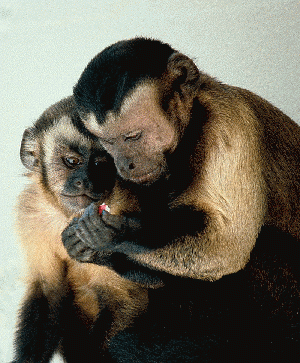
Capuchin monkeys sharing
(Image by (From Wikimedia) (Photo courtesy of Frans de Waal.), Author: (Photo courtesy of Frans de Waal.)) Details Source DMCA
The first part of a two part Interview conducted September 11, 2013
Link to audio podcast.
Transcript checked by Dick Overfield.
R.K.: Welcome to the Rob Kall Bottom Up Radio Show WNJc1360 AM out of Washington Township New Jersey reaching Metro Philly and South Jersey. Sponsored by Opednews.com. My guest tonight is Frans de Waal, he's a Dutch-American biologist who has been named among Time Magazine's "100 Most Influential People," He is the Charles Howard Candler professor of Primate Behavior in the Emory University psychology department in Atlanta, Georgia, he is the director of the Living Links Center at the Yerkes National Primate Research Center, and is the author of numerous books including Chimpanzee Politics and Our Inner Ape. His latest, The Bonobo and the Atheist: In Search of Humanism Among the Primates. His research centers on primate social behavior, including conflict resolution, cooperation, inequity aversion, and food-sharing. Welcome to the show.
F.W.: I'm happy to be there.
R.K.: You've been working for almost forty years with primates. What is the number one thing you have learned in working with them?
F.W.: Well, I have always focused on social behavior and I've always been impressed by how intensely social they are. Of course, when I started primates were usually depicted like all animals, as competitive and aggressive and only selfish, and so on. This whole view of nature as a competitive place, a dog-eat-dog world and the main thing that I've learned is, yes, there is plenty of competition, there's no denying that, but there's also plenty of cooperation and actually primates live in groups, in large groups sometimes, for cooperative reasons. Otherwise they would be living alone, of course.
Next Page 1 | 2 | 3 | 4 | 5 | 6 | 7 | 8 | 9
(Note: You can view every article as one long page if you sign up as an Advocate Member, or higher).





